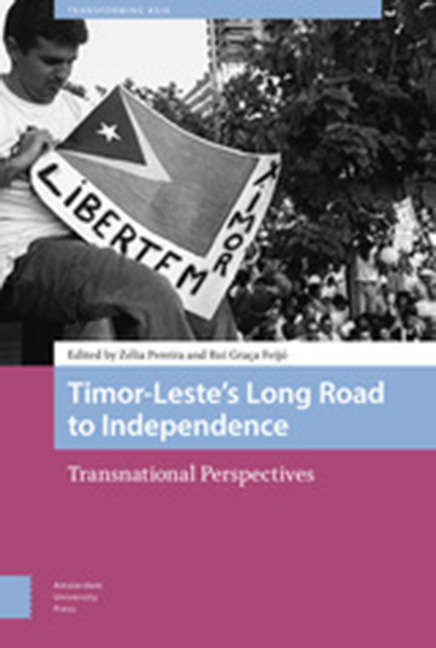Book contents
- Frontmatter
- Contents
- Acknowledgements
- A Note on the Name of the Country
- List of Figures
- Introduction: Timor-Leste’s Long Road to Independence: Outline for an Analytical Framework
- Part One Before The Portuguese Decolonisation
- Part Two The Portuguese Revolution Arrives In Timor-Leste
- Part Three Reaction To The Indonesian Invasion Of Timor-Leste
- Part Four Resisting The Indonesian Annexation Of Timor-Leste
- Index
2 - Elusive Colonialism in the Age of Bandung: Portugal, Timor-Leste and Indonesia, c. 1947–1974
Published online by Cambridge University Press: 14 February 2024
- Frontmatter
- Contents
- Acknowledgements
- A Note on the Name of the Country
- List of Figures
- Introduction: Timor-Leste’s Long Road to Independence: Outline for an Analytical Framework
- Part One Before The Portuguese Decolonisation
- Part Two The Portuguese Revolution Arrives In Timor-Leste
- Part Three Reaction To The Indonesian Invasion Of Timor-Leste
- Part Four Resisting The Indonesian Annexation Of Timor-Leste
- Index
Summary
Abstract
In the aftermath of WWII, Portugal's colonial structure endured several blows, the first pieces collapsing after India's decision to take Goa (1961). Unexpectedly, Portuguese colonial presence ended up outlasting some of its European counterparts. This chapter takes a look at the Portuguese predicament in Asia and discusses the reasons that allowed for the retention of Portuguese sovereignty in Timor until 1974, arguing that such an “anachronism” can only be understood with reference to the political conveniences of Indonesia, as well as to Lisbon's willingness to adjust its policies to the new balance of power in that part of the world. Retaining the façade of colonial sovereignty (essential for the preservation of its “imperial mystique” in Africa and elsewhere), at the cost of adopting a deferential attitude towards Jakarta, was the paramount goal of Lisbon.
Keywords: Portugal, Indonesia, Bandung, European colonialism, decolonisation
The Asian continent was the epicentre of momentous geopolitical changes in the aftermath of the Second World War – the independence of India and Pakistan, Ceylon and Burma, the setting up of the Malayan federation (and the eruption of a guerrilla war lasting from 1948 to 1960), the complete extinction of the “unequal treaties” in China and the victory of the communists there in 1949, as well as the Netherlands’ recognition of Indonesia’s independence in that same year, being some of the milestones of this process.
Significant vestiges of imperial rule (formal and informal) still lingered on well into the mid-1950s, but a decade after the end of hostilities in Europe and the Pacific and the rise of a new world order symbolised by the United Nations Charter, it was evident that the colonial system that had been implemented by the European powers in that part of the world was now seen as unacceptable, with calls for its complete abolition being widely heard across the region.
Indeed, when the Afro-Asian Conference of Bandung was assembled in 1955, a sense of exhilaration concerning the dismissal of the cultural and racial hierarchies brought forth by Western imperialism was perceptible in many of the speeches delivered in the Indonesian city. Afro-Asian leaders in Bandung may have been divided over many issues, but their public rhetoric was fairly homogenous when it came to repudiating racism and colonialism.
- Type
- Chapter
- Information
- Timor-Leste's Long Road to IndependenceTransnational Perspectives, pp. 99 - 124Publisher: Amsterdam University PressPrint publication year: 2023



